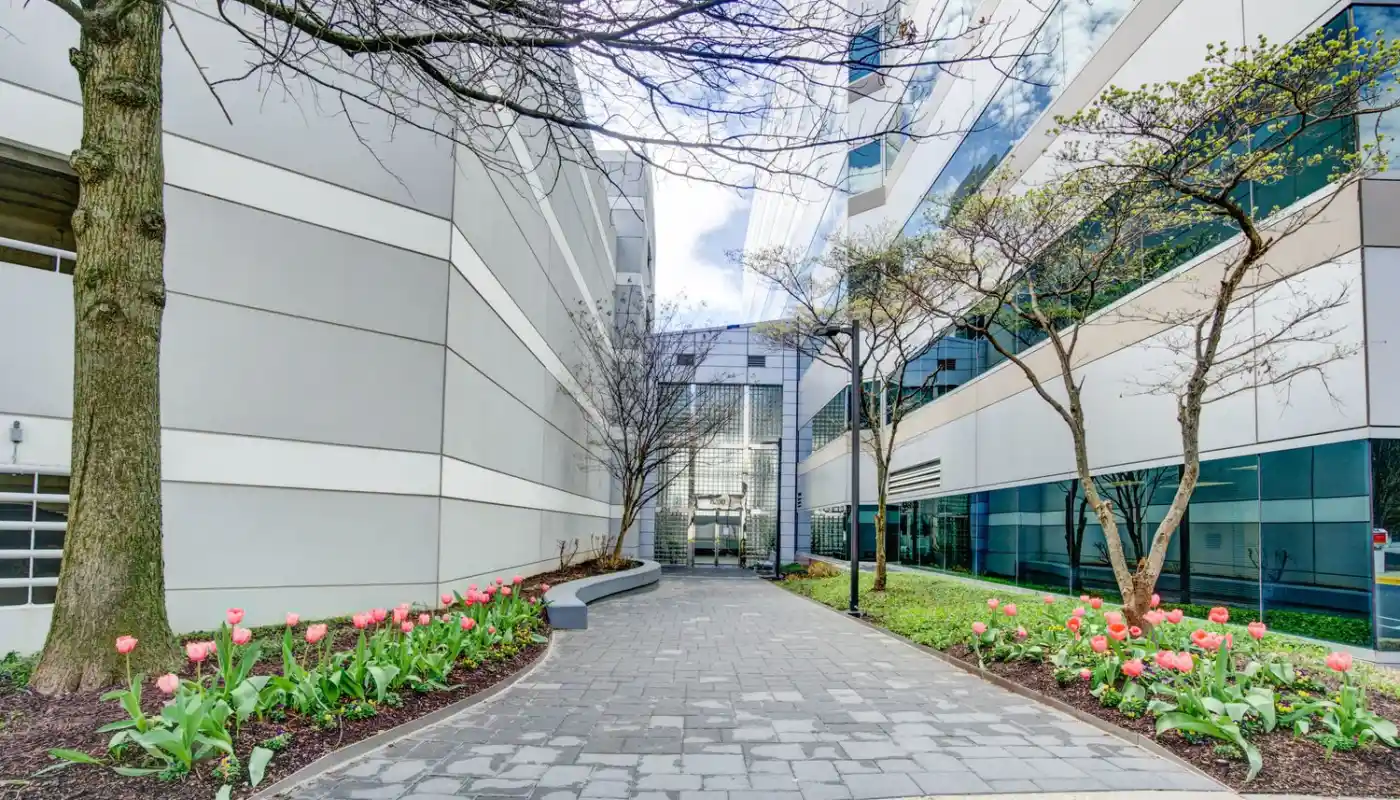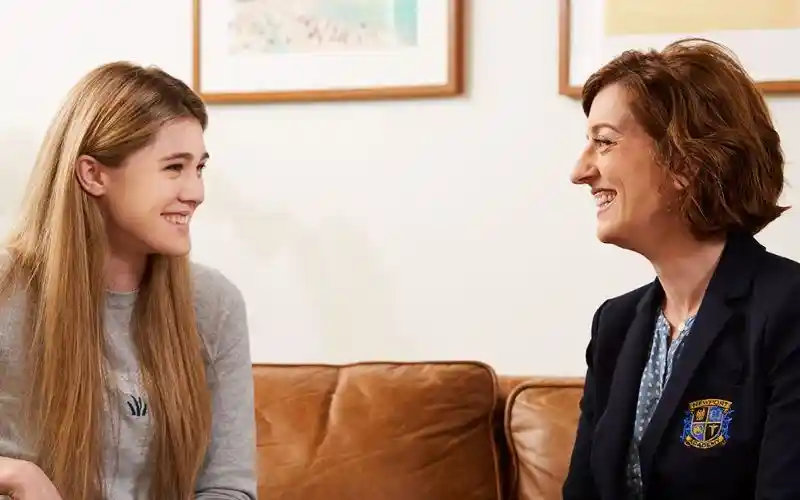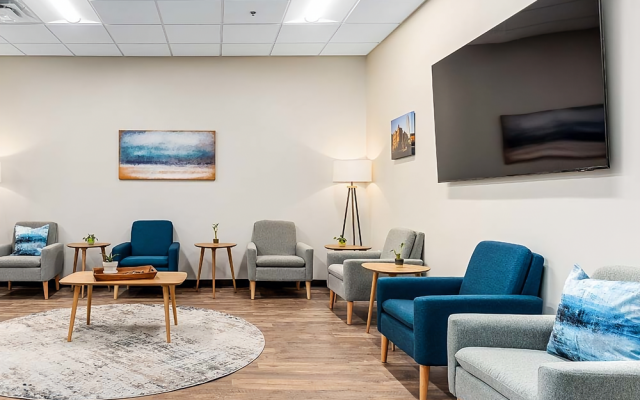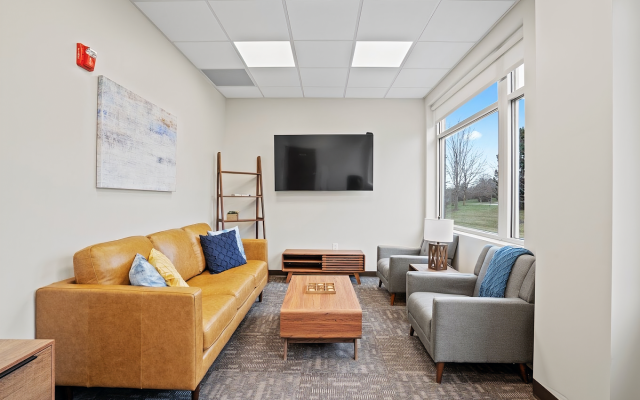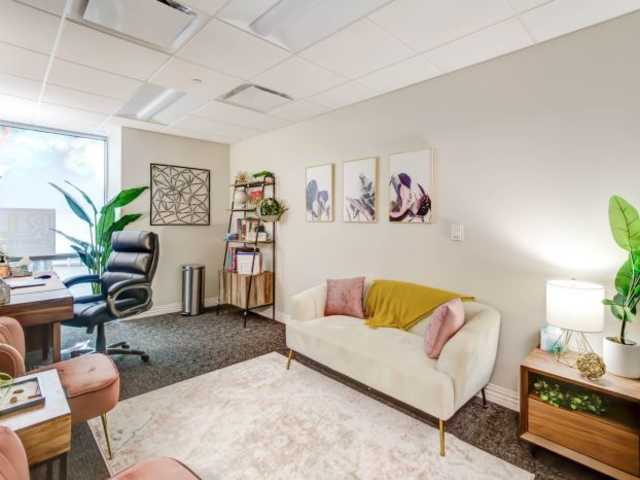
Fairfax, Virginia, United States
Newport Academy Fairfax
Verified
Verified
This provider’s information has been quality-checked by Recovery.com’s Research Team for accuracy and completeness, including center verification through appropriate third-party organizations.
Joint Commission Accredited
The Joint Commission accreditation is a voluntary, objective process that evaluates and accredits healthcare organizations (like treatment centers) based on performance standards designed to improve quality and safety for patients. To be accredited means the treatment center has been found to meet the Commission's standards for quality and safety in patient care.
Provider's Policy
The insurances listed represent the current in-network partners for this location. While not shown here, Newport also accepts many out-of-network plans and are happy to work with you to explore coverage options.
Estimated Cash Pay Rate
The cost listed here (Call For Rates) is an estimate of the cash pay price. Center pricing can vary based on program and length of stay. Contact the center for more information. Recovery.com strives for price transparency so you can make an informed decision.
Highlights from the Center
Highlights
These highlights are provided by and paid for by the center.
1-on-1 Counseling
Holistic Approach
Trauma-Informed Care
Adolescents
About Newport Academy Fairfax
Newport Academy’s Fairfax outpatient center welcomes teens ages 12-18 who need therapeutic support for depression, anxiety, and difficult social functioning. Their outpatient program aims to heal the whole family too, connecting parents with local support groups and holding family therapy sessions on site. Newport’s evidence-based and integrated approach sets teens up for the successful futures waiting for them.
Collaborative Care
Newport Academy works with teens’ existing support systems to create an even stronger system. They offer academic support for teens in school, guiding them through schoolwork with tutors and a collaborative peer community. With outpatient care, teens come to Newport’s Fairfax location after school. Afternoon sessions include individual, group, and family therapy, plus experiential therapies.
Adventure in Recovery
Teens at Newport Academy experience the restorative ability of adventure and outdoor fun. Newport Academy’s Fairfax location brings patients to the nearby Great Falls Park. Other nature preserves close by offer more opportunities to get outside and enjoy activities like hiking, rock climbing, and kayaking.
Healing for The Whole Family
Newport Academy provides attachment-based family therapy, helping heal relationships and helping parents become strong allies for their teen’s healing. Education on mental health extends throughout the whole family. Teens can learn the “why” behind behaviors, discovering ways to avoid triggers through personalized therapy and thorough assessments. Newport Academy in Fairfax invites teens in with comfortable rooms, a cozy atmosphere, and the privacy and respect they deserve.
Read More
Insurance Accepted
Provider's Policy:The insurances listed represent the current in-network partners for this location. While not shown here, Newport also accepts many out-of-network plans and are happy to work with you to explore coverage options.
More Newport Healthcare Locations
Individualized And Evidence-Based
Newport Academy treats each teen with the individualized care they need and deserve. No two teens are alike, and neither is their treatment. Newport’s team of professionals work to create custom care, using evidence-based methods with proven results and trackable, successful outcomes. No two families are alike either, making their care plan just as personal.
Academic Support
Teens continue school in treatment, led by Newport Academy’s accredited tutors. Just like their therapeutic care, teens receive an individualized academic plan, with 1-1 tutoring and peer support. This all begins in the same supportive and safe environment of treatment, with all academics on site and led by Newport’s teaching staff. Partnership with teens’ local schools ensures they stay on track and excel.
Family-Wide Healing
Newport Academy extends healing to the whole family. Master-level therapists lead attachment-based family therapy to help teens and their parents heal strained relationships and make healthy ones. Educational sessions support parents in learning more about mental health, helping them become the supportive allies they strive to be. Together, teens and their families learn how to move forward with hope and cope with challenges as they come.
Urban And Rural Adventures
Newport Academy’s outpatient program in Fairfax supports teens exploring the city and spending time in nature. Trips to the nearby Great Falls Park allow for hikes and reflection. Teens explore Fairfax too, going to Tysons Corner and seeing the local shops and culture. Downtown Washington DC is also nearby for easy access and travel opportunities.

Center Overview
Estimated Cash Pay Rate
Adolescents
Teens receive the treatment they need for mental health disorders and addiction, with the added support of educational and vocational services.
Young Adults
Emerging adults ages 18-25 receive treatment catered to the unique challenges of early adulthood, like college, risky behaviors, and vocational struggles.
LGBTQ+
Addiction and mental illnesses in the LGBTQ+ community must be treated with an affirming, safe, and relevant approach, which many centers provide.

Treatment Focus
You can admit to this center with a primary substance use disorder or a primary mental health condition. You'll receive support each step of the way and individualized care catered to your unique situation and diagnosis.
Treatment
Specializations
Adolescents
Teens receive the treatment they need for mental health disorders and addiction, with the added support of educational and vocational services.
ADHD, ADD
ADHD is a common mental health condition caused by dopamine imbalance. Common symptoms include inattention, hyperactivitiy, and impulsivity.
Anxiety
Anxiety is a common mental health condition that can include excessive worry, panic attacks, physical tension, and increased blood pressure.
Depression
Symptoms of depression may include fatigue, a sense of numbness, and loss of interest in activities. This condition can range from mild to severe.
Family Therapy
Family therapy addresses group dynamics within a family system, with a focus on improving communication and interrupting unhealthy relationship patterns.
Gaming
Compulsive gaming is most often a problem for children and teens. The disorder can affect physical health, sleep, and the ability to focus at school.
Suicidality
With suicidality, a person fantasizes about suicide, or makes a plan to carry it out. This is a serious mental health symptom.
Trauma
Some traumatic events are so disturbing that they cause long-term mental health problems. Those ongoing issues can also be referred to as "trauma."
Treatment Services
Day Treatment
In a PHP, patients live at home but follow an intensive schedule of treatment. Most programs require you to be on-site for about 40 hours per week.
Intensive Outpatient Program
In an IOP, patients live at home or a sober living, but attend treatment typically 9-15 hours a week. Most programs include talk therapy, support groups, and other methods.
Licensed Primary Mental Health
Some primary care providers offer mental health diagnosis and treatment. This can prevent patients from developing more serious conditions.
Outpatient
During outpatient rehab, patients attend a structured treatment program while continuing to live at home.
Approaches
Evidence-Based
A combination of scientifically rooted therapies and treatments make up evidence-based care, defined by their measured and proven results.
Experiential
Expressive tools and therapies help patients process past situations, learn more about themselves, and find healing through action.
Family Involvement
Providers involve family in the treatment of their loved one through family therapy, visits, or both–because addiction is a family disease.
Individual Treatment
Individual care meets the needs of each patient, using personalized treatment to provide them the most relevant care and greatest chance of success.
Therapies
1-on-1 Counseling
Patient and therapist meet 1-on-1 to work through difficult emotions and behavioral challenges in a personal, private setting.
Meditation & Mindfulness
A practiced state of mind that brings patients to the present. It allows them to become fully aware of themselves, their feelings, and the present moment.
Trauma-Specific Therapy
This form of talk therapy addresses any childhood trauma at the root of a patient's current diagnosis.
Adventure Therapy
This experiential approach uses the physical and emotional challenges of outdoor activities as tools for personal growth.
Art Therapy
Visual art invites patients to examine the emotions within their work, focusing on the process of creativity and its gentle therapeutic power.
Experiential Therapy
With this approach, patients heal by doing. Therapists help patients process difficult emotions to speak, using guided activities like art or dance.
Eye Movement Therapy (EMDR)
Lateral, guided eye movements help reduce the emotional reactions of retelling and reprocessing trauma, allowing intense feelings to dissipate.
Family Therapy
Family therapy addresses group dynamics within a family system, with a focus on improving communication and interrupting unhealthy relationship patterns.
Motivational Interviewing
Based on the idea that motivation to change comes from within, providers use a conversational framework to discover personalized methods for change.
Conditions We Treat
Grief and Loss
Grief is a natural reaction to loss, but severe grief can interfere with your ability to function. You can get treatment for this condition.
Personality Disorders
Personality disorders destabilize the way a person thinks, feels, and behaves. If untreated, they can undermine relationships and lead to severe distress.
ADHD, ADD
ADHD is a common mental health condition caused by dopamine imbalance. Common symptoms include inattention, hyperactivitiy, and impulsivity.
Anger
Although anger itself isn't a disorder, it can get out of hand. If this feeling interferes with your relationships and daily functioning, treatment can help.
Anxiety
Anxiety is a common mental health condition that can include excessive worry, panic attacks, physical tension, and increased blood pressure.
Bipolar
This mental health condition is characterized by extreme mood swings between depression, mania, and remission.
Codependency
Codependency is a pattern of emotional dependence and controlling behavior. It's most common among people with addicted loved ones.
Depression
Symptoms of depression may include fatigue, a sense of numbness, and loss of interest in activities. This condition can range from mild to severe.
Eating Disorders
An eating disorder is a long-term pattern of unhealthy behavior relating to food. Most people with eating disorders have a distorted self-image.
Gaming
Compulsive gaming is most often a problem for children and teens. The disorder can affect physical health, sleep, and the ability to focus at school.
Substances We Treat
Co-Occurring Disorders
A person with multiple mental health diagnoses, such as addiction and depression, has co-occurring disorders also called dual diagnosis.
Drug Addiction
Drug addiction is the excessive and repetitive use of substances, despite harmful consequences to a person's life, health, and relationships.
Experience
Personal Amenities
Activities
Yoga
Yoga is both a physical and spiritual practice. It includes a flow of movement, breathing techniques, and meditation.
Off-Site Activities
Professional Staff

Leigh McInnis
Executive Director
LPC

Prakash Thomas
Psychiatrist
MD

Nicole Renée Matthews
Director of Yoga

Robyn Le Ann
Director of Equine Services
View More Team Members
Learn more about Newport Academy Fairfax
Testimonial
Newport Academy is a solid dual diagnosis program. The team of therapists, LCDC counselors, professionals, educators and psychiatrists who work closely with the kids and families truly care. My daughter, now a young adult is in stable, consistent sobriety and college.
Erin H.
We love hearing about your treatment experience
Help individuals and families seeking treatment by sharing your first-hand experience with this treatment provider. Review Guidelines.








